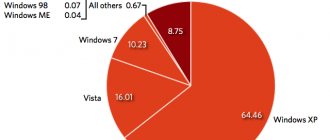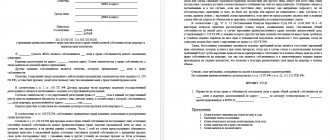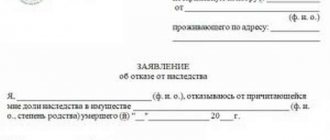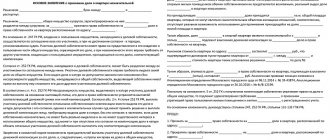Legislation on minimum shares in an apartment
The Civil Code provides for the possibility of owning an apartment on the right of common shared ownership. However, the law does not limit the maximum number of owners. Therefore, residential premises can be simultaneously owned by any number of owners.
Housing legislation provides for a minimum standard of housing for 1 person, for 2 citizens and for each additional person. Depending on the number of family members and the total area of the apartment. A family may receive the status of needing improved housing conditions. However, no one will forbid continuing to move in relatives.
Only the owners of the property have rights to housing. It is the owner who has the right not only to reside, but also to dispose of the property. The owner can sell his share, bequeath or donate.
In recent years, the purchase of shares in an apartment by black realtors has become widespread. The share is registered as the property of citizens who move in and poison the lives of the co-owners in order to buy out their shares for next to nothing (professional neighbors).
Since 2021, the State Duma has been considering a bill aimed at banning the sale of micro-shares in order to protect the rights of bona fide share owners. However, as of May 2021, the law has not been adopted.
The main changes that the bill provides for:
- preservation of the right to move into an apartment only for owners of a certain number of square meters. m.;
- imposing a ban on the registration of citizens in excess of the area norm (1 registered citizen per 8 sq.m.);
- the possibility of selling micro-shares only to co-owners (including by force).
In general, the adoption of the bill should not affect legal transactions and inheritance of apartments. The ban is imposed exclusively on the acquisition of shares by unauthorized citizens.
The legislator wants to reduce the fragmentation of apartments into shares and close the gap in the law for black realtors. In 2021, there are no legal methods to combat the occupation of housing by professional neighbors.
This is important to know: Allocation of shares to children in an apartment or house based on maternity capital in 2021
Ways to circumvent pre-emptive rights
One of the methods has already been mentioned - donation . But besides this, sellers also use a secured loan scheme. That is, money is allegedly borrowed from the buyer on the security of a share, the debt is not paid on time - the share goes to the borrower. In this case, the preemptive right can be circumvented, but not to the full extent. The point is: in order to “mortgage” your share, you also need to obtain the consent of other owners of shared property. Both ways to bypass the pre-emptive right have been known for a long time. Such transactions are easily disputed, recognized as fictitious, and in addition, you can get an article for fraud.
Buying a share from relatives
In fact, such a transaction is no different from buying from any other owner. It is carried out according to the same scheme, and the purchase/sale agreement must be certified by a notary.
Principle of calculating the minimum share
To calculate the minimum share, it is necessary to find out the standard of living space per resident in a specific locality. The standard is established by municipal legislation. The national average is from 8 to 14 sq.m. Federal legislation sets the standard at 12 sq.m.
Important! The standard is established regardless of the citizen’s age. Therefore, the size of the area will be the same for a working citizen, a child and a pensioner.
To calculate the minimum share in a specific residential premises, you must use the following formula:
where MD is the minimum share;
OP is the total area;
N – standard area for 1 person.
Minimum shares in apartments
In the first half of 2021, there is no concept of a minimum share. Therefore, the owner can sell, donate, bequeath to relatives and strangers parts of the property right of any size. For example, in Moscow, a popular type of transaction is the sale of 1/100 share of an apartment.
The bill plans to resolve this issue. It establishes the following types of minimum shares:
- for an apartment with a total area of less than 30 sq.m. –no more than 3 owners (1/3 each);
- for residential premises from 30 to 60 sq.m. – no more than 6 owners (1/6 each);
- for housing with an area from 60 to 120 sq.m. – no more than 10 owners (1/10 each);
- for an apartment with an area of 120 or more sq.m. – no more than 15 owners (1/15).
However, as of May 2021, these standards are not established by law. Therefore, sales of micro shares are still possible.
Differences between Minimal and Minor Proportions
The law distinguishes such concepts as minimal and insignificant share. Let's look at the differences.
Differences between minimal and insignificant shares
| No. | Minimum | Minor |
| 1 | Expressed as sq.m. | Expressed in fractional terms |
| 2 | Includes owner accommodation (from 8 sq.m.) | Is conditional (1/100) |
| 3 | Forced redemption is possible on an individual basis (if the share area is small and the total area of the housing is large enough) | Can be forcibly purchased by co-owners by court decision |
| 4 | Can be expressed as a room | Cannot be expressed as a separate room |
Responsibility for owners of a minimum share
The law does not provide for liability for persons buying and selling minimum shares. However, the owners of such property are “under attack.” They can lose their property at any time.
The main disadvantages of owning micro shares:
- the order of use cannot be determined;
- it is necessary to have another place of residence;
- it cannot be isolated in nature;
- co-owners can buy it forcibly by court decision.
Perhaps in the near future the sale of microshares will become illegal. However, at present it is possible that part of the ownership may be sold by one of the co-owners to third parties. Therefore, there is no need to spoil relations with co-owners. If the situation has already happened, housing lawyers will come to the rescue. To receive an urgent free consultation, leave a request on the website. A specialist will contact you immediately.
- Due to constant changes in legislation, regulations and judicial practice, sometimes we do not have time to update the information on the site
- In 90% of cases, your legal problem is individual, so independent protection of rights and basic options for resolving the situation may often not be suitable and will only lead to a more complicated process!
Therefore, contact our lawyer for a FREE consultation right now and get rid of problems in the future!
Methods for allocating a share.
In an apartment that is in common ownership, shares can be allocated.
This is done in two ways:
- by agreement;
- judicially.
If the owners were able to agree, then they enter into a voluntary agreement. It specifies the size of the share, the procedure and conditions of ownership of real estate.
The agreement usually contains the following information:
- procedure for using household appliances;
- Possibility of staying with pets;
- cleaning public areas, etc.
The share may provide for the allocation of an isolated room suitable for living.
Such a transaction can be registered with Rosreestr and a certificate of ownership of the part can be obtained.
The procedure is not possible if the apartment is one-room. In a situation where the allocated premises are smaller in area than other parts, the owner is entitled to monetary compensation from other owners.
If an agreement cannot be reached, one of the owners may go to court. The claim is filed at the location of the property.
The official will take into account the specifics of the particular case, the area of the property, the possibility of allocating a separate room, etc.
Minimum ownership share in an apartment
The minimum share of ownership in housing is a small part of the property that can be sold, in which you can register, and so on. At the time of writing this article, there is no strict understanding in the legislation of the size of such a share, however, a certain judicial practice has already developed, which is usually followed to resolve disputes. In addition, a new law may be adopted in the near future, which will precisely describe what size of share can be considered the minimum.
List of documents for purchasing a share
A passport is enough for the buyer. But you should ask the seller for the full package:
- passport;
- an extract from the Unified State Register (it confirms ownership and indicates the share);
- document of title (donation agreement, purchase/sale agreement, etc.);
- house register or an extract from it (to find out the persons registered in the housing);
- certificate of absence of contracts for housing and communal services;
- building passport (for checking the plan);
- documents confirming purchase offers to co-owners;
- consent of the spouse ( if the seller is married!, if a widower - a death certificate, if divorced - a divorce certificate.)
Determining the minimum share size in an apartment
According to established practice, the minimum permissible share size is directly related to the total area of the property:
| Apartment area | Share |
| 30-60 sq.m. | 1/3 |
| 60-120 sq.m. | 1/10 |
| More than 120 sq.m. | 1/15 |
It should be borne in mind that at the moment these figures are primarily advisory in nature and are not enshrined in legislation. As a result, it is now still possible to buy 1/1000 share in a one-room apartment with an area of 20 sq.m. and even register in it.
Forced purchase of a share in an apartment
If problems arise with the owners of a small share, under certain conditions this part can be forcibly redeemed through the court. But for this you need:
- It was impossible to allocate the share in kind.
- The owner of the share must have other housing and must have no interest in using this share.
FREE CONSULTATIONS are available for you! If you want to solve exactly your problem, then
:
- describe your situation to a lawyer in an online chat;
- write a question in the form below;
When there is no pre-emptive right when selling a share
There are only three cases when, in a transaction with a share, the other owners do not have a pre-emptive right to purchase. One of the methods is actively used by citizens to speed up the transaction process and bypass other co-owners.
- If the transaction involves a share, it is free of charge. That is, it passes to another owner as a gift. This is the method that sellers often practice: money is also transferred, and the share is transferred to the buyer under a gift agreement.
- If there are several co-owners and several of them are ready to buy a share. Here competition for the right to purchase is possible. The seller chooses himself, based on the proposed conditions.
- If the share is sold through an auction.
The concept of a minimum share
In modern civil law, the concept of a minimum share in an apartment . According to current legislation, there is also the concept of “micro share”, which is the smallest unit within the framework of the interpretation of the minimum share.
A minimum share in the right is understood as ownership of a small part of the property, while the owner of the minimum share has the full range of legal rights.
The sale of a minimum share of any property, including an apartment, is carried out with the permission of the owners of other shares.
For rent (hire)
Is it possible to rent out a minimum share of an apartment?
If the size meets the requirements of the Housing Code of the Russian Federation, there will be no problems with renting out. The main condition is isolation of the living space . For example, it could be a living room: living room, bedroom, etc.
The second point is the consent of the remaining co-owners . If the share is not allocated in kind, their consent is required. You cannot rent out a room without the permission of the owners, otherwise they may file a lawsuit and invalidate the transaction.
Read more about all the issues with rent in the article “Renting out a share in an apartment without the consent of the owners.”
What is the minimum share in an apartment?
Currently, there is an acute problem of legal determination of what share in an apartment is minimal . The owner of even one square meter in an apartment can become a serious problem for other owners.
The absence of restrictions on dividing living space into fractions of up to several centimeters and the ability to register it as the property of dozens of people is a serious source of problems in the housing market.
Knowing the minimum share in an apartment that can be sold or bought is necessary in cases of purchasing a share for the purpose of obtaining registration, and not for living. For 2021, the minimum share is calculated based on the indicators shown in the figure below.
The ratio of the size of the share in the apartment to its area
Such a division raises serious questions and requires improvement of the current legislation. The new law has already been discussed in the State Duma.
Problems with the minimum share in an apartment
In recent years, cases of using minimum shares in an apartment by scammers and extortionists have become more frequent. In addition, dishonest husbands and wives drive their exes out of their living space.
There has been a noticeable increase in cases where, through the sale of microshares to professional “survivors,” black realtors evicted pensioners or forced them to pay exorbitant sums for minimal shares in an apartment. Currently, the courts are practically powerless in such situations.
The cost of micro shares raises many questions. The possibility of registering with them in the future is also doubtful.
Modern judicial practice knows many examples when people are left homeless. The legislation is powerless in this case, since the scammers, having taken over a share in the apartment, simply outlive the legal owners, making their life unbearable. People are either left homeless or forced to pay huge sums of money to avoid ending up on the street.
New law on microshares
The bill is aimed against so-called raiders who register ownership of micro-shares and then survive the current owners. There are cases when people were left homeless or were looking for money to buy out microshares. The introduction of amendments should limit fraudulent schemes.
The initiative was submitted for discussion to the State Duma on December 21, 2017. The bill has already passed the first reading and amendments are being prepared. However, it is too early to talk about its application - as of the first half of 2021, it has not yet entered into legal force . However, courts use some of the sentences when making their verdicts.
The main essence of the law on microshares:
- a ban on their sale to strangers;
- restriction in registration (registration) if the share does not correspond to the minimum housing standard per person (from 8 to 15 m²);
- a ban on moving into an apartment if the owner’s share is less than the accounting norm (footage).
An exception would be the splitting of an apartment into microshares as a result of privatization or inheritance.
Expert opinion
Makarov Igor Tarasovich
Legal consultant with 8 years of experience. Specialization: criminal law. Extensive experience in document examination.
Grandmother owns a room in a communal apartment. A pensioner wants to leave her home to her grandchildren. The problem is that there are 5 grandchildren. If the inheritance opens, the room will be divided among all the grandchildren.
Each of them will receive 1/5 of the share, i.e. microlobe.
According to the new law, such a division does not pose any problems, since there is a family connection.
The 3-room apartment belongs to four owners. One of them wants to split the ¼ share into 2 parts - keep ⅔ for himself and sell ⅓ to his friend.
However, the buyer is not a family member and is not listed as a relative of any of the occupants. If previously it was possible to purchase a third ¼ share and take possession of 1/12 of the housing, the new law will limit such fragmentation.
Considering that 1/12 in a 3-room apartment is a micro-share, the transaction will not take place. The new owner will not be able to live in the apartment, since part of it is less than the housing registration norm - 8-10 m².









